Vincent De Haître feels a bit like a forgotten man. The three-time Olympian has no national carding funding, he doesn’t train with the national team and he wasn’t included for an order of Team Canada skinsuits.
Nevertheless, the 29-year-old from Cumberland was still there on the start line for the first ISU Speed Skating World Cup of the season in Japan, and his plan is to again be well known come the 2024 World Single Distances Championships Feb. 15-18 in Calgary.
“I’m going to try my best to get back to the old ways,” De Haître said during an interview with the Ottawa Sports Pages earlier this week, before he went out and finished as the top Canadian in Friday’s men’s 1,000 metres race in Obihiro.
He placed 11th in a time of 1:09.318 – .53 seconds back of a podium place. At the same meet, Olympic mass start silver medallist Ivanie Blondin kicked off her season by winning her speciality race, while fellow Gloucester Concordes product Isabelle Weidemann is scheduled to join in Saturday for the women’s 1,500 m and team pursuit.
It’s been over six years since De Haître finished the 2016-2017 World Cup season ranked second in the world in his signature 1,000 m. He also won a World Championships silver medal that season at age 22.
“If you spend a year and you have a few good results, but then you do two years away, people forget that one year,” signals De Haître, whose most recent Olympics were the Tokyo Games in 2021 as a track cyclist. “If you look over the last 10 years, I would have had a very successful career – I did three Olympics in two sports.
“The hard part is if you don’t have an Olympic medal, you’re not quite remembered for being good.”
De Haître had been in good form leading up to the Pyeongchang 2018 Winter Olympics, but he injured his ankle just before the event and had a top finish of 19th.
The Ottawa Bicycle Club product then switched his focus to summer and helped power Canada to a men’s team pursuit national record and fifth-place finish at the Tokyo Olympics, which were rescheduled from 2020 due to the pandemic.
COVID cloud
If there was a contest for athletes most adversely impacted by COVID, De Haître may well be a contender for a top podium position. He wanted to switch back to speed skating and compete at the Beijing 2022 Winter Games, but the summer postponement kept him on his bike an extra year.
“It was one more year away from skating than planned,” recounts De Haître. “I committed to the (cycling) team. I wasn’t going to leave them after being selected to go to the Olympics.”
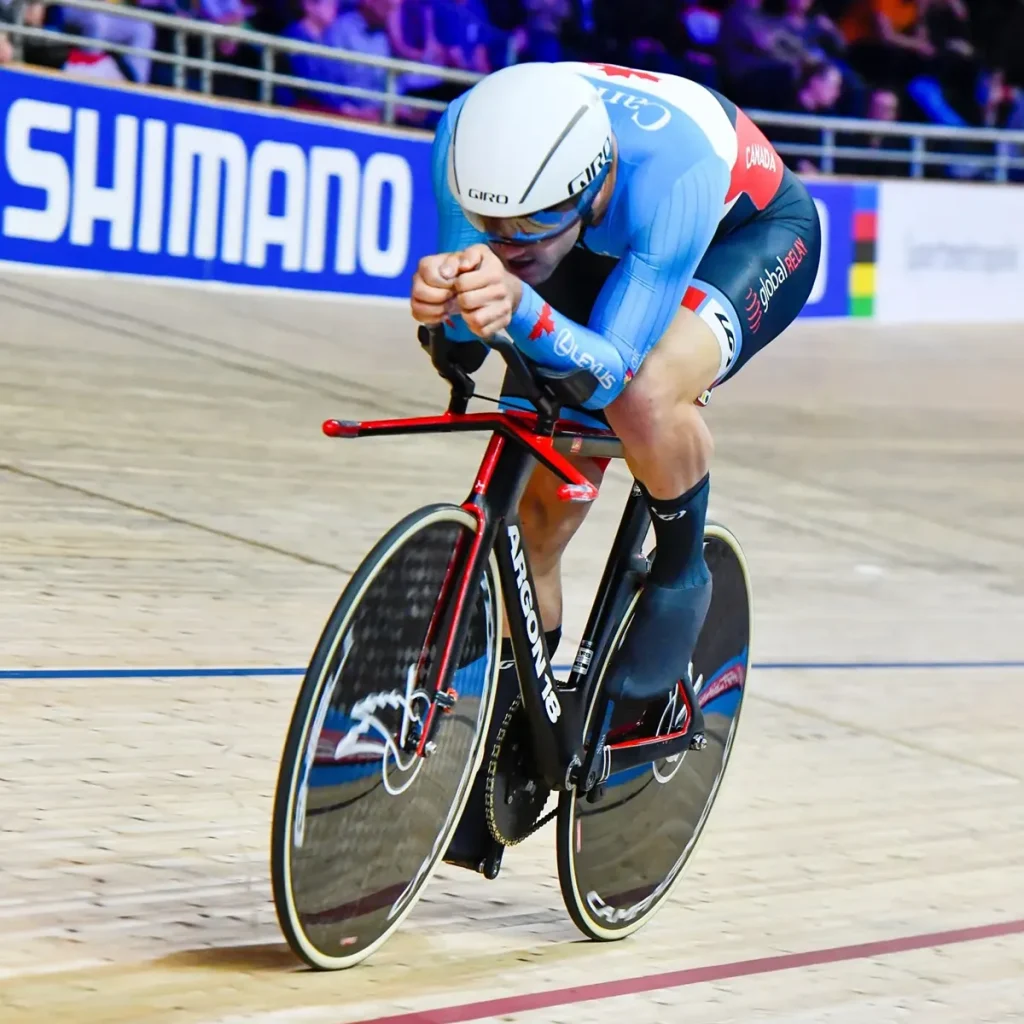
Vincent De Haître helped Canada to a fifth-place finish in the men’s team pursuit track cycling competition at the Tokyo Olympics. Photo: COC
Though cycling and speed skating are both leg-powered sports, the side-to-side motion in speed skating and the up-and-down in cycling are different, and De Haître found the skills required for each sport were not quite interchangeable at a world-class level.
The past holder of the national 1 km time trial cycling record still plans to ride his bike in the coming years and maybe even compete now and then, but he says he won’t be switching back-and-forth between Games to go all-in to chase an Olympic medal.
“I might pick it up again, but only once I know I’m never coming back to skating,” states De Haître. “If I knew there was going to be a pandemic, I would have just waited until the end of my skating career to pursue the Summer Olympics, because quite frankly, the skating career was tracking pretty nicely.
“It would have saved me a lot of heartache along the way.”
Speed bumps
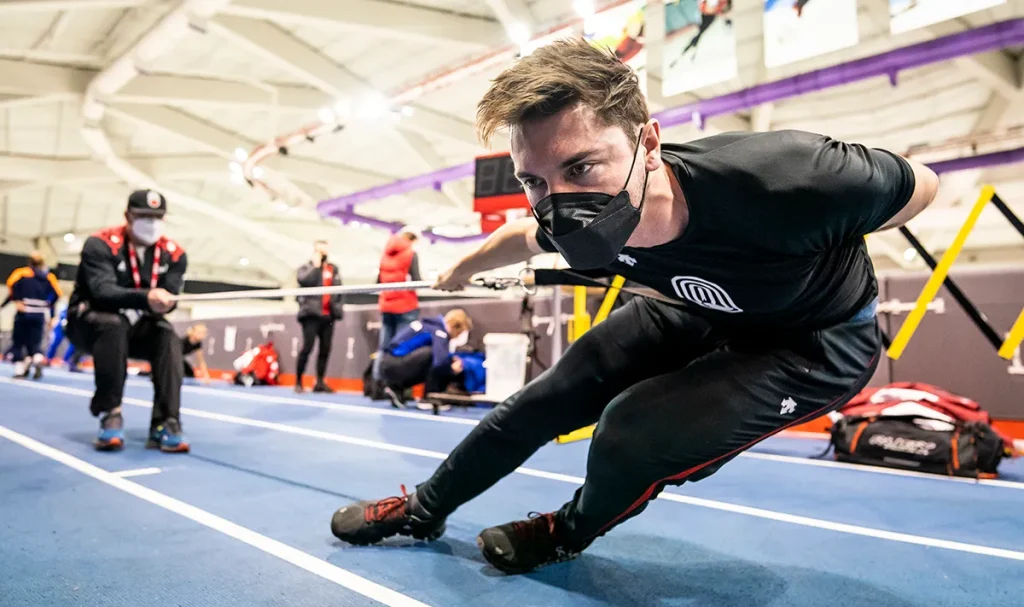
Vincent De Haître raced in four World Cup speed skating events in fall 2021, but the Canadian Olympic team trials were cancelled due to rising COVID infections. Photo: Dave Holland / Speed Skating Canada
Following the Summer Olympics, De Haître barely took a one-week off-season before resuming speed skating training full-steam in pursuit of a berth in the Pyeongchang Games, which began just six months after Tokyo closed.
But COVID disrupted those plans again. De Haître made Canada’s World Cup team, though his best result in fall competitions was 14th. He’d been training hard with his eye on being in top shape for the Canadian Olympic team trials, but those wound up being cancelled as COVID resurged. Canada selected its Pyeongchang team based on World Cup results and De Haître was left out. Despite an appeal, he had to stay home.
“I’ll be honest, I didn’t watch [the Olympics],” recalls De Haître. “I was so fatigued because I hadn’t taken a break.”
De Haître’s struggles continued into the 2022-2023 season. He failed to qualify for the first World Cups of the season. When he later got the chance to race on the global circuit, he straddled between the ‘A’ and ‘B’ divisions for the top-20, which was a tough change for an athlete not long removed from consistently challenging for the podium event after event. De Haître finished the season ranked 30th and lost his spot as an official member of the national team.
“I had two pretty much bad seasons in a row since coming back from cycling,” reflects De Haître. “The struggle that I’ve had over the last couple of years is the training just wasn’t what I needed and we kept going down a route that just wasn’t working.”
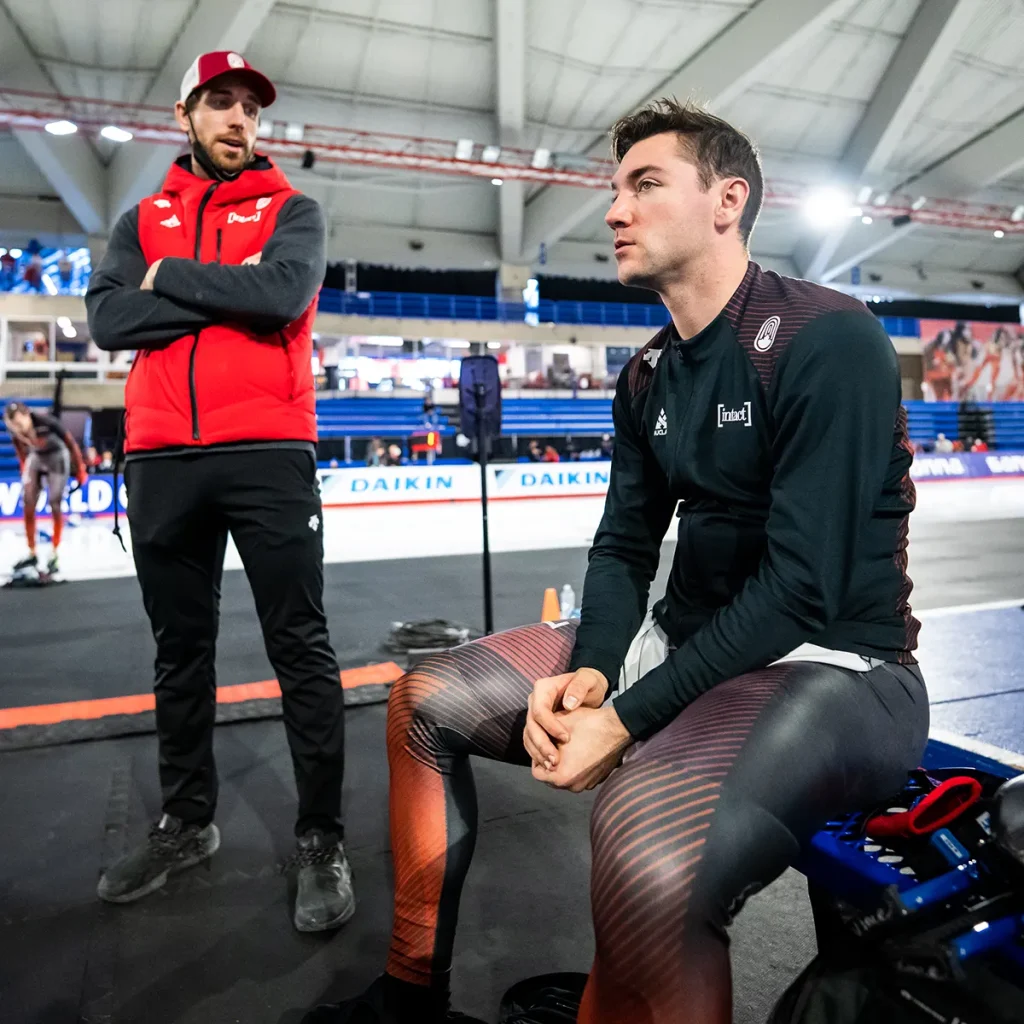
Vincent De Haître competed mainly in the ‘B’ division for skaters ranked outside the top 20 during the 2022-2023 World Cup season. Photo: Dave Holland / Speed Skating Canada
Despite not receiving funding, the Canadian men’s 1,000 m record holder was still able to work with the national team as a training partner, but that arrangement fizzled too.
“I asked the coach if I could have an individual program for things that I need to work on specifically, and he said, ‘If you want to do something different, there isn’t a place for you on this team,’ so I got axed from the training partner program,” De Haître recounts. “So, ever since May or April, I’ve been writing my own training, and doing it all on my own.”
Training by Vince
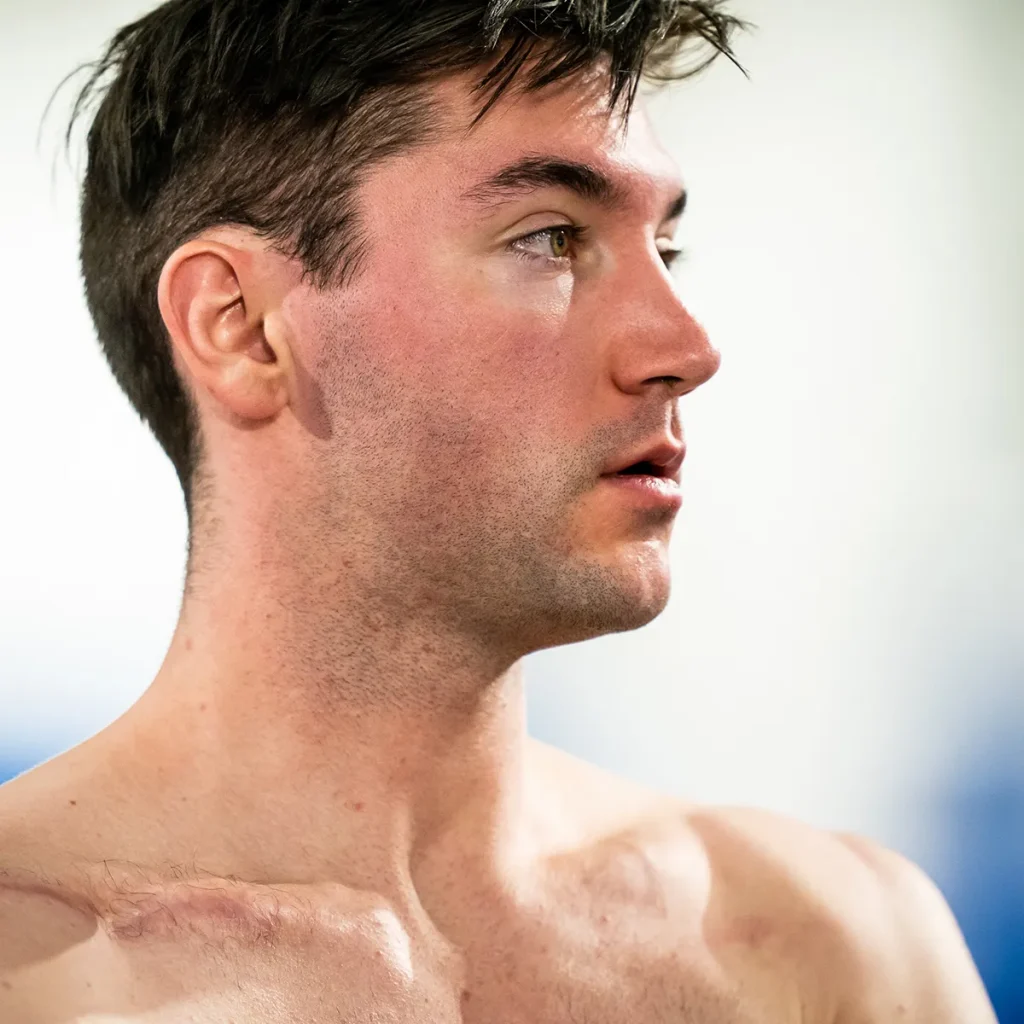
Vincent De Haître is back with the Oval program that he joined when he first moved to Calgary. Photo: Dave Holland / Speed Skating Canada
De Haître explains that he felt the Canadian team’s group training plan didn’t match his needs. Firstly, there isn’t a playbook on how a speed skater should return from cycling. He’s a little shorter but bigger than some of the other Canadian skaters, and he excels at the 1,000 and 1,500 m distances especially, while others have more of an all-around range.
“When you’re young, you can do almost anything and you’ll improve. I think I kind of showed that my potential as an athlete would overcome maybe some shortcomings of the training program,” says the winner of World Cup gold and silver medals in the 2016-2017 season.
“After 11 years on the national team, I think you pick up a thing or two,” he adds. “It’s not like I’m blindly going about it. I’ve been doing my own research on training zones and energy systems, so I have knowledge, I just don’t have the piece of paper that says I do.”
Going solo has proven both positive and difficult.
“When you write your own training, you have to remember, what is the training you like doing versus what is the training that is most beneficial for you? And then you have to always choose the one that is most beneficial,” De Haître outlines. “It’s nice, but it’s challenging.
“When I get to a session that I’m like, ‘Oh no, not this one,’ I tell myself that a month ago I said I was gonna do it and now I have to do it, because me tired won’t make the same decisions as me when I was fresh and writing the program. I can’t just slack off because I’m tired.”
Funding muddle
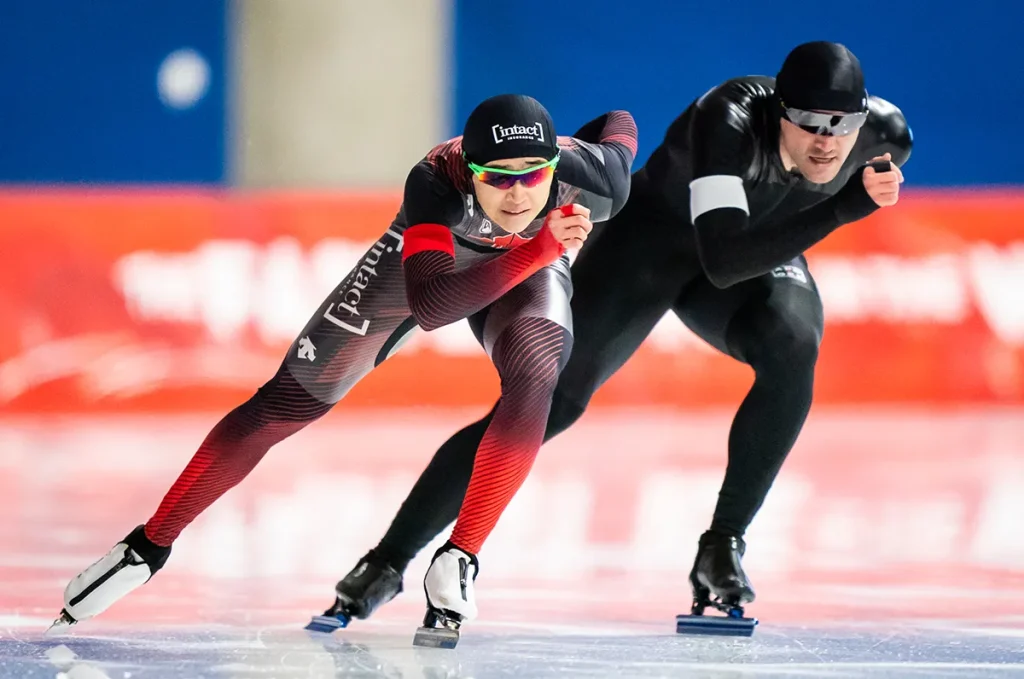
Vincent De Haître (in background) finished third behind winner Connor Howe in the men’s 1,000 m at the Canadian Championships on Oct. 6 in Calgary. Photo: Dave Holland / Speed Skating Canada
Without a spot on the national team, De Haître paid $5,400 to join the Calgary Olympic Oval program. That’s where the Béatrice-Desloges high school grad landed when he first moved out west as a teenager, which gives him access to a locker, ice time, a coach and the sports medicine centre at the University of Calgary.
De Haître says he feels very fortunate to have the support of his family to help pay the bills since they believe he’ll turn things around.
He took a positive step forward at the early-October Canadian Speed Skating Championships when he finished third in the 1,000 m behind Laurent Dubreuil and Connor Howe, who finished second overall in the World Cup’s 1,000 m and 1,500 m disciplines respectively last season.
“I was pretty happy with the overall performance. I think there was more in there, but as long as I made the World Cup team, that’s all that matters,” recalls the Canadian Athletes Now Fund-supported athlete. “It was kind of a confirmation that what I had been doing has been working.”
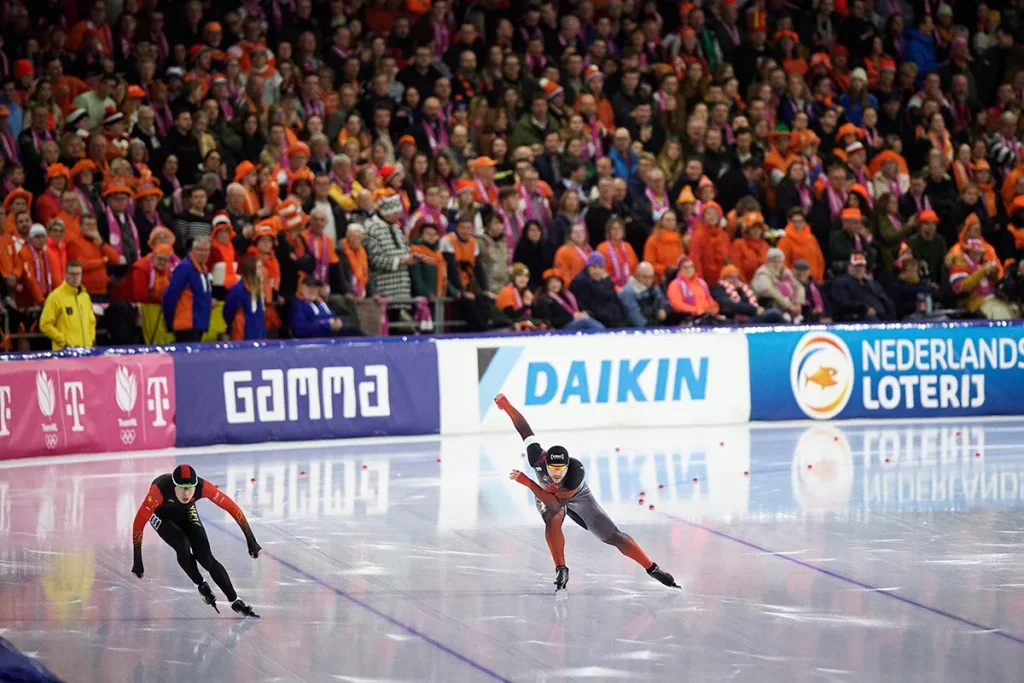
Vincent De Haître placed 23rd in the men’s 1,000 m at the 2023 ISU World Speed Skating Championships in the Netherlands. Photo: Rafal Oleksiewicz / Speed Skating Canada
Despite earning the chance to race for Canada at fall World Cups in Japan, China, Norway and Poland, De Haître’s national carding to support living and training expenses hasn’t returned. He explains that in the past Speed Skating Canada would set aside cards for athletes who earned spots through trials, but this year all cards were assigned to the national team members that had already been chosen earlier.
“Essentially making sure that I can’t get funding,” he says.
It also “wasn’t a very nice way to start the year” when De Haître had to wait for his new skinsuit to arrive just days before the season opener. Team Canada “had to prioritize the athletes we thought were going to make the World Cup” when they placed an earlier order, he was told.
It’s been “frustrating” for De Haître to feel forgotten at times, but he tries to use it as fuel.
“I like making people know and feel that they are wrong,” he indicates. “Maybe I’m a little bit stubborn in that sense. But the harder they make it for me, the more foolish I want them to seem for doing so.
“That’s my perspective on it. It’s more of a competitive mindset kind of thing.”
Comeback track
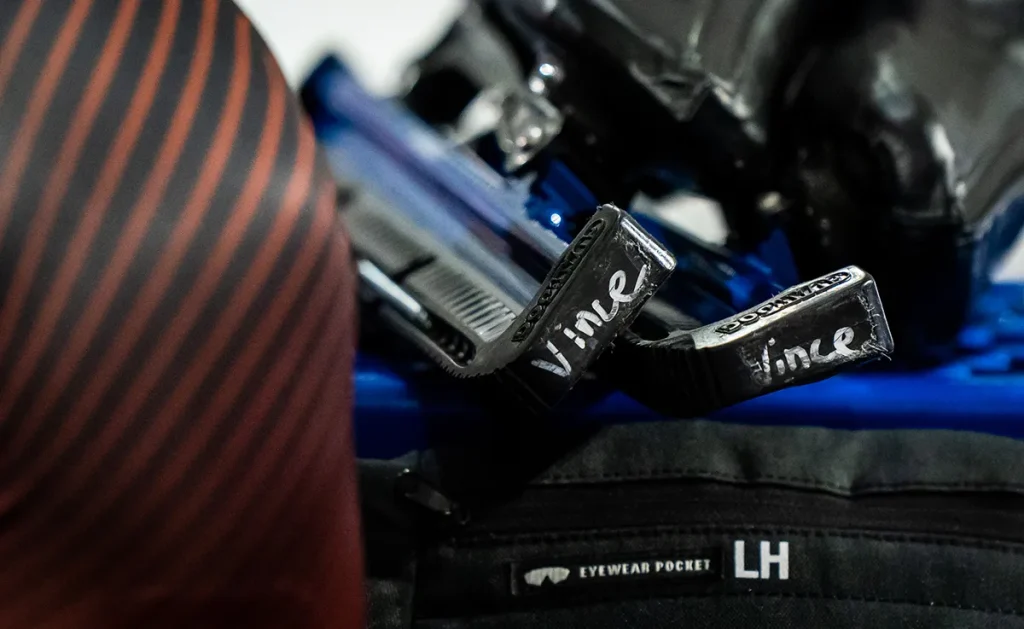
Vincent De Haître is using older skating boots after the new ones he used last season didn’t work out well. Photo: Dave Holland / Speed Skating Canada
De Haître is now almost 15 pounds lighter than last season, which matches his weight before he switched to cycling. Nicknamed Quadzilla, De Haître never has trouble gaining muscle mass – he says he gets “muscle hypertrophy” if he lifts too much. Staying lean can sometimes be a challenge though, and last season, he found his post-workout recovery drink caused too much weight gain.
The back injury that’s also slowed De Haître in recent years hasn’t bothered him so far this season, after placing extra attention on core stability and strength during summer training.
He says his body is feeling good, but his speed skating technique is still a work in progress. De Haître made some technical adjustments when he got new skate boots last year, but they didn’t work out, so he’s back to his old boots, which are indeed aging and will need to be replaced soon. He’s struggled with lower speed workouts, but his rhythm at higher speeds feels good.
“I think things are moving in the right direction,” De Haître signals. “I’m pretty happy with where I’m at, and I plan to continue on a positive progression trend for the course of the year – at least, that’s how I wrote my program to be.”
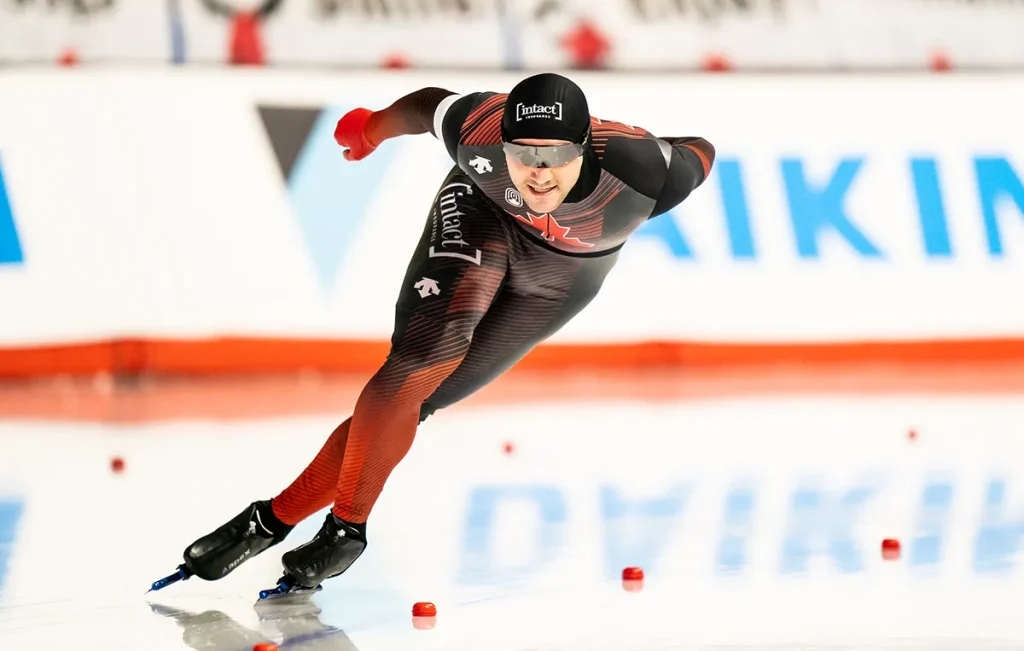
Vincent De Haître is focused on performing well at the 2024 World Single Distances Speed Skating Championships, to be held from Feb. 15-18 in Calgary. Photo: Dave Holland / Speed Skating Canada
De Haître may get to race reasonably close to home for the first-ever World Cup in Quebec City from Feb. 2-4, though the World Championships in Calgary are his main focus.
“I’m pretty excited about that. To have not only Calgary, but two home races in one year is pretty big,” he highlights. “Racing at home is nice, but doing well at home is a lot better.”
De Haître says he wants to “return to a competitive level and a consistent level of performance” this season. He also wants to show through his performance that his approach to training has merit and hopes it could be incorporated into the national team environment in the future.
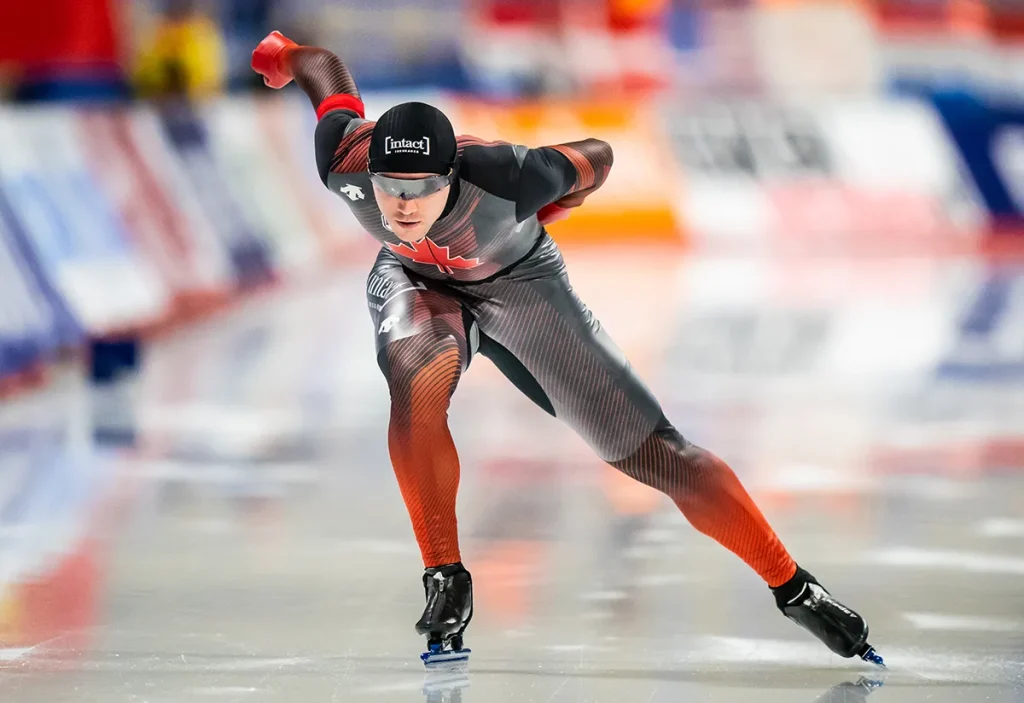
Vincent De Haître is seeking a strong finish for his 2023-2024 season, which will conclude with competitions in Canada. Photo: Dave Holland / Speed Skating Canada
He adds that fundraising is another chief goal of his this season, but not only for himself. Over the summer, De Haître helped raise some money to pay Oval training fees for a young athlete who wasn’t on the national or development team.
“Then I thought, ‘You know what? This is something that I’d like to try and keep doing,’” recounts De Haître, who’s also enjoyed giving tips to developing skaters who are also part of the Oval program. “I’ve always wanted to give back, but I couldn’t really find a way to do it.”
So, De Haître pledges that half of all the funds he receives through donations via his website or full-sledged sponsorships will go to other athletes who aren’t carded.
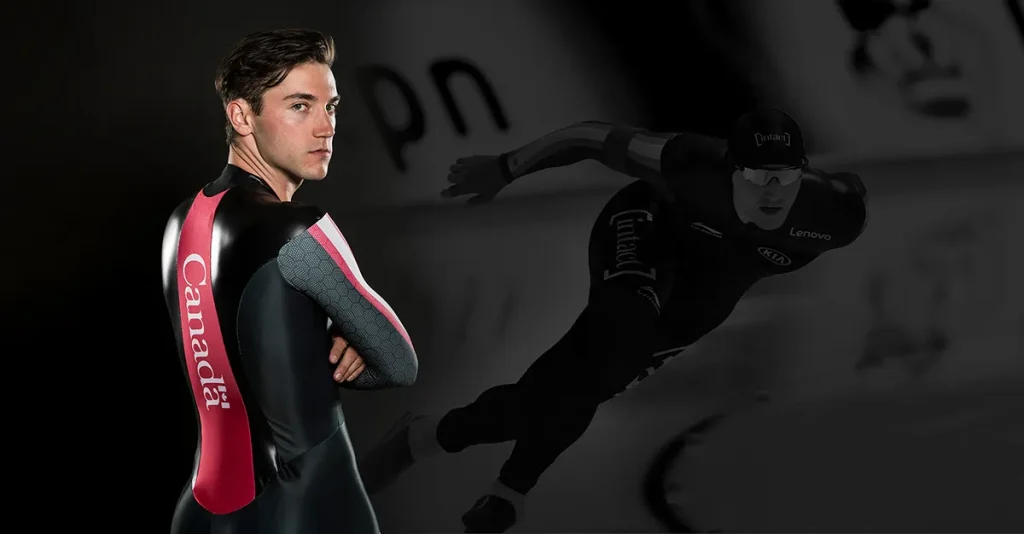
“It sounds pessimistic, but money does solve a lot of problems to be honest,” he underlines. “Especially for a young athlete, when you’re buying equipment, and you’re dealing with training costs, maybe tuition that’s $5,000 a semester, and you have to eat a certain way – it’s just not cheap.”
De Haître thinks that sponsorship development is the kind of work he may like to pursue after his athletic career, and his current efforts can help towards that.
“I want to continue with my career and if I can find a way to use my platform to not only help myself but also help others along the way, that’s kind of a legacy I want to leave,” he says, before quickly adding that he doesn’t plan to leave any time soon.
“I’m 29 years old, I should be in what is considered the prime of my sport,” De Haître notes. “I’m not done. The body is still strong.”


